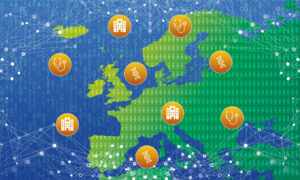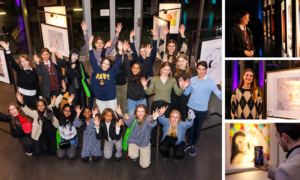Discover the research schooner Tara and her new microplastics mission in the Hamburg harbour on 17 June
The Tara Ocean Foundation and the European Molecular Biology Laboratory (EMBL) in Hamburg invite you to a press conference on the rising threat of microplastics in European rivers and the ocean.
When: Monday 17 June at 10:30
Where: The press conference will be held on the Tara schooner at the Sandtorhafen in the Hamburg harbour
What: A press conference on the new Tara mission on microplastics and Tara’s cooperation with EMBL. A tour of the schooner will be organised with the seamen after the briefing
Who: The press conference will be attended by:
- Romain Troublé (Tara Executive Director)
- Edith Heard (EMBL Director General)
- Martin Hertau (captain of the Tara schooner)
Registration: To participate in the conference, please register by sending an email to iris.kruijen@embl.de before 13 June. You will have the opportunity to ask questions and interview the press conference participants as well as the scientists of the Tara mission on site
During several expeditions, Tara has collected microplastics in her nets, making it clear that microplastics are ubiquitous throughout the ocean all over the world. Now the Tara Ocean Foundation and its scientific partner – the French National Centre for Scientific Research, CNRS – will identify the sources of plastic pollution in European seas and assess the impact of microplastics on marine biodiversity and the food chain.
The Tara crew will gather samples at the mouths of 10 major European rivers: the Thames (UK); the Elbe and Rhine (Germany); the Seine, Loire, Garonne and Rhône (France); the Tagus (Portugal); the Ebro (Spain); and the Tiber (Italy). The collected microplastics will provide clues to identify their origin, find the densest concentrations of microplastics and target them. This will help us to fight the microplastic problem at its sources.
In Hamburg, Tara will not only gather samples of microplastics from the Elbe, but also present the new mission to journalists, stakeholders, schools and public authorities to raise awareness of this increasing threat and the reasons we need to preserve the ocean.
There are limited slots available to board Tara and embark on a short trip along the Elbe. If interested, please let us know by sending an email to iris.kruijen@embl.de.
The stopover is also an opportunity to discover the interdisciplinary research of EMBL, major partner of the Tara expeditions and the place where the idea for Tara Oceans (2009–2013) was born. This project was initiated by EMBL group leader Eric Karsenti, who led the mission’s scientific activities.
EMBL drives visionary fundamental research and technology development in the life sciences from six sites across Europe – one of which is EMBL Hamburg, which is located on the DESY Campus and has a research focus on structural biology.
Elodie Bernollin (Tara Ocean Foundation)
elodie@taraexpeditions.org
+33 (0)1 42 01 38 57
+33 (0)6 95 73 26 88 (mobile)
Entdecken Sie am 17. Juni im Hamburger Hafen den Forschungsschoner Tara und seine neue Mission zum Thema Mikroplastik
Die Tara Oceans Foundation und das Europäische Laboratorium für Molekularbiologie (EMBL) in Hamburg laden Sie zu einer Pressekonferenz über die zunehmende Bedrohung durch Mikroplastik in europäischen Flüssen und im Meer ein.
Wann: Montag, 17. Juni um 10:30 Uhr
Wo: Die Pressekonferenz findet auf dem Schoner Tara im Sandtorhafen im Hamburger Hafen statt.
Thema: Eine Pressekonferenz über die neue Tara-Expedition zum Thema Mikroplastik und die Zusammenarbeit von Tara mit dem EMBL. Nach der Konferenz wird mit den Seeleuten eine Besichtigung des Schoners organisiert.
Wer: An der Pressekonferenz nehmen die folgenden Personen Teil:
- Romain Troublé (Tara Geschäftsführer)
- Edith Heard (EMBL Generaldirektorin)
- Martin Hertau (Kapitän des Schoners)
Registrierung: Um an der Konferenz teilzunehmen, melden Sie sich bitte bis zum 13. Juni an, indem Sie auf diese Email antworten. Vor Ort haben Sie die Möglichkeit Fragen zu stellen und die Teilnehmer der Pressekonferenz sowie die Wissenschaftler der Tara-Mission zu interviewen.
Während vergangener Expeditionen sammelte Tara Mikroplastik in ihren Netzen. Das machte deutlice, dass Mikroplastik in den Gewässern der ganzen Welt allgegenwärtig ist. Jetzt werden Tara und ihr wissenschaftlicher Partner – das französische Nationales Zentrum für wissenschaftliche Forschung (CNRS) – die Quellen für Mikroplastik in europäischen Gewässern identifizieren und die Auswirkungen von Mikroplastik auf die marine Biodiversität und die Nahrungskette bewerten.
Das Tara-Team wird Proben an den Mündungen von 10 großen europäischen Flüssen sammeln: Themse (Großbritannien), Elbe und Rhein (Deutschland), Seine, Loire, Garonne und Rhone (Frankreich), Tejo (Portugal), Ebro (Spanien), Tiber (Italien). Das gesammelten Mikroplastik liefert Hinweise mit denen seine Herkunft bestimmt werden kann. Auch die Verteilung kann so gemessen werden, womit sich die dichtesten Konzentrationen von Mikroplastik erfassen lassen. Das wird dabei helfen, das Mikroplastik-Problem an den Quellen zu bekämpfen.
In Hamburg wird Tara nicht nur Proben von Mikroplastik aus der Elbe sammeln, sondern auch die neue Mission Journalisten, Interessengruppen, Schulen und Behörden vorstellen. Damit soll das Bewusstsein für diese zunehmende Bedrohung geschärft und gezeigt werden, warum wir den Ozean schützen müssen.
Es stehen begrenzte Plätze zur Verfügung, um an Bord von Tara zu gehen und eine kurze Reise entlang der Elbe zu unternehmen. Wenn Sie daran Interesse haben, informieren Sie uns bitte via Email.
Der Zwischenstopp ist auch eine Gelegenheit, die interdisziplinäre Forschung des EMBL, einem wichtigen Partner der Tara-Expeditionen und dem Geburtsort der Idee von Tara-Oceans (2009-2013), zu entdecken. Dieses Projekt wurde von EMBL-Gruppenleiter Eric Karsenti initiiert, der die wissenschaftlichen Aktivitäten der Mission leitete.
An sechs Standorten in ganz Europa treibt das EMBL visionäre Grundlagenforschung und Technologieentwicklung in den Lebenswissenschaften voran. Einer der Standorte ist EMBL Hamburg mit Sitz auf dem DESY-Campus und dem Forschungsschwerpunkt Strukturbiologie.



